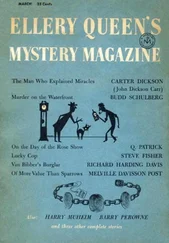Аврам Дэвидсон - Ellery Queen’s Mystery Magazine. Vol. 67, No. 3. Whole No. 388, March 1976
Здесь есть возможность читать онлайн «Аврам Дэвидсон - Ellery Queen’s Mystery Magazine. Vol. 67, No. 3. Whole No. 388, March 1976» весь текст электронной книги совершенно бесплатно (целиком полную версию без сокращений). В некоторых случаях можно слушать аудио, скачать через торрент в формате fb2 и присутствует краткое содержание. Город: New York, Год выпуска: 1976, Издательство: Davis Publications, Жанр: Детектив, на английском языке. Описание произведения, (предисловие) а так же отзывы посетителей доступны на портале библиотеки ЛибКат.
- Название:Ellery Queen’s Mystery Magazine. Vol. 67, No. 3. Whole No. 388, March 1976
- Автор:
- Издательство:Davis Publications
- Жанр:
- Год:1976
- Город:New York
- ISBN:нет данных
- Рейтинг книги:5 / 5. Голосов: 1
-
Избранное:Добавить в избранное
- Отзывы:
-
Ваша оценка:
- 100
- 1
- 2
- 3
- 4
- 5
Ellery Queen’s Mystery Magazine. Vol. 67, No. 3. Whole No. 388, March 1976: краткое содержание, описание и аннотация
Предлагаем к чтению аннотацию, описание, краткое содержание или предисловие (зависит от того, что написал сам автор книги «Ellery Queen’s Mystery Magazine. Vol. 67, No. 3. Whole No. 388, March 1976»). Если вы не нашли необходимую информацию о книге — напишите в комментариях, мы постараемся отыскать её.
Ellery Queen’s Mystery Magazine. Vol. 67, No. 3. Whole No. 388, March 1976 — читать онлайн бесплатно полную книгу (весь текст) целиком
Ниже представлен текст книги, разбитый по страницам. Система сохранения места последней прочитанной страницы, позволяет с удобством читать онлайн бесплатно книгу «Ellery Queen’s Mystery Magazine. Vol. 67, No. 3. Whole No. 388, March 1976», без необходимости каждый раз заново искать на чём Вы остановились. Поставьте закладку, и сможете в любой момент перейти на страницу, на которой закончили чтение.
Интервал:
Закладка:
Ellery Queen’s Mystery Magazine. Vol. 67, No. 3. Whole No. 388, March 1976
You Can’t Be Too Careful
by Ruth Rendell [1] © 1976 by Ruth Rendell.
“This is a very nice neighborhood,” Mrs. Swanson, the landlady, said, “but the crime rate in London is rising all the time and I always say you can’t be too careful ... ”
A new prize-caliber story from Ruth Rendell, winner of the Edgar award from the Mystery Writers of America for the best mystery short story published in America during 1974 (“The Fallen Curtain,” EQMM, August 1974).
Della Galway went out with a man for the first (and almost the last) time on her nineteenth birthday. He parked his car, and as they were going into the restaurant she asked him if he had locked all the doors and the boot. When he turned back and said yes, he’d better do that, she asked him why he didn’t have a burglarproof locking device on the steering wheel.
Her parents had brought her up to be cautious. When she left that happy home in that safe little provincial town, she took her parents’ notions with her to London. At first she could only afford the rent of a single room. It upset her that the other tenants often came in late at night and left the front door on the latch. Although her room was at the top of the house and she had nothing worth stealing, she lay in bed sweating with fear. At work it was the same. Nobody bothered about security measures. Della was always the last to leave, and sometimes she went back two or three times to check that all the office doors and the outer door were shut.
The personnel officer suggested she see a psychiatrist.
Della was very ambitious. She had an economics degree, a business studies diploma, and had come out top at the end of her secretarial course. She knew a psychiatrist would find something wrong with her — they had to earn their money like everyone else — and long sessions of treatment would follow which wouldn’t help her towards her goal, that of becoming the company’s first woman director. They always held that sort of thing against you.
“That won’t be necessary,” she said in her brisk way. “It was the firm’s property I was worried about. If they like to risk losing their valuable equipment, that’s their lookout.”
She stopped going back to check the doors — it didn’t prey on her mind much since her own safety wasn’t involved — and three weeks later two men broke in, stole all the electric typewriters, and damaged the computer beyond repair. It proved her right, but she didn’t say so. The threat of the psychiatrist had frightened her so much that she never again aired her burglar obsession at work.
When she got a promotion and a salary rise, she decided to get a flat of her own. The landlady was a woman after her own heart. Mrs. Swanson liked Della from the first and explained to her, as to a kindred spirit, the security arrangements.
“This is a very nice neighborhood, Miss Galway, but the crime rate in London is rising all the time and I always say you can’t be too careful.”
Della said she couldn’t agree more.
“So I always keep this side gate bolted on the inside. The back door into this little yard must also be kept locked and bolted. The bathroom window looks out onto the garden, you see, so I like the garden door and the bathroom door to be locked at night too.”
“Very wise,” said Della, noting that the window in the bed-sitting room had screws fixed to its sashes which prevented its being opened more than six inches. “What did you say the rent was?”
“Twenty pounds a week.” Mrs. Swanson was a landlady first and a kindred spirit secondly, so when Della hesitated she said, “It’s a garden flat, completely self-contained, and you’ve got your own phone. I shan’t have any trouble in letting it. I’ve got someone else coming to view it at two.”
Della stopped hesitating. She moved in at the end of the week, having supplied Mrs. Swanson with references and assured her she was quiet, prudent as to locks and bolts, and not inclined to have “unauthorized” people to stay overnight. By unauthorized people Mrs. Swanson meant men. Since the episode over the car on her nineteenth birthday, Della had entered tentatively upon friendships with men, but no man had ever taken her out more than twice and none had ever got as far as to kiss her. She didn’t know why this was. She had always been polite and pleasant, insisting on paying her share, careful to carry her own coat, handbag and parcels so as to give her escort no trouble, ever watchful of his wallet and keys, offering to have the theater tickets in her own safekeeping, and anxious not to keep him out too late. That one after another man dropped her worried her very little. No spark of sexual feeling had ever troubled her, and the idea of sharing her orderly, routine-driven life with a man — untidy, feckless, casual creatures as they all, with the exception of her father, seemed to be — was a daunting one. She meant to get to the top on her own. One day perhaps, when she was about thirty-five and with a high-powered lady executive’s salary, then if some like-minded, quiet and prudent man came along... In the meantime, Mrs. Swanson had no need to worry.
Della was very happy with her flat. It was utterly quiet, a little sanctum tucked at the back of the house. She never heard a sound from her neighbors in the other parts of the house and they, of course, never heard a sound from her. She encountered them occasionally when crossing from her own front door to the front door of the house. They were mouselike people who scuttled off to their holes with no more than a nod and a “good evening.” This was as it should be. The flat, too, was entirely as it should be.
The bed-sitter looked just like a livingroom by day, for the bed was let down from a curtained recess in the wall only at night. Its window overlooked the yard, which Della never used. She never unbolted the side gate or the back door or, needless to say, attempted to undo the screws and open the window more than six inches.
Every evening, when she had washed the dishes and wiped down every surface in the immaculate well-fitted kitchen, had her bath, made her bedtime drink, and let the bed down from the wall, she went on her security rounds just as her father did at home. First she unlocked and unbolted the back door and crossed the yard to check that the side gate was securely fastened. It always was, as no one ever touched it, but Della liked to make absolutely sure, and sometimes went back several times in case her eyes had deceived her. Then she bolted and locked the back door, the garden door, and the bathroom door. All these doors opened out of a small room, about ten feet square — Mrs. Swanson called it the garden room — which in its turn could be locked off by yet another door from the kitchen. Della locked it. She rather regretted she couldn’t lock the door that led from the kitchen into the bed-sitting room but, owing to some oversight on Mrs. Swanson’s part, there was no lock on it. However, her own front door in the bed-sitter itself was locked, of course, on the Yale. Finally, before getting into bed, she bolted the front door.
Then she was safe. Though she sometimes got up once or twice more to make assurance trebly sure, she generally settled down at this point into blissful sleep, certain that even the most accomplished of burglars couldn’t break in.
There was only one drawback — the rent.
“The flat,” said Mrs. Swanson, “is really intended for two people. A married couple had it before you, and before that two ladies shared it.”
“I couldn’t share my bed,” said Della with a shudder, “or, come to that, my room.”
Читать дальшеИнтервал:
Закладка:
Похожие книги на «Ellery Queen’s Mystery Magazine. Vol. 67, No. 3. Whole No. 388, March 1976»
Представляем Вашему вниманию похожие книги на «Ellery Queen’s Mystery Magazine. Vol. 67, No. 3. Whole No. 388, March 1976» списком для выбора. Мы отобрали схожую по названию и смыслу литературу в надежде предоставить читателям больше вариантов отыскать новые, интересные, ещё непрочитанные произведения.
Обсуждение, отзывы о книге «Ellery Queen’s Mystery Magazine. Vol. 67, No. 3. Whole No. 388, March 1976» и просто собственные мнения читателей. Оставьте ваши комментарии, напишите, что Вы думаете о произведении, его смысле или главных героях. Укажите что конкретно понравилось, а что нет, и почему Вы так считаете.












